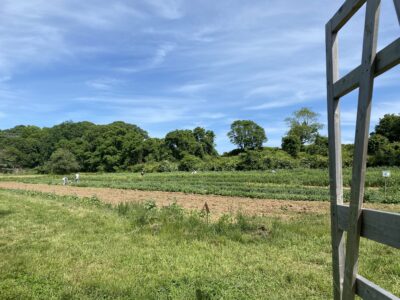Blog
On Poetry and Flowers | A Note From Layton
By Layton Guenther
Just last month one of my favorite poets, Mary Oliver, passed away at the age of 83. She died in Florida, though had spent half a century living in Provincetown, Massachusetts. Much of her writing was dedicated to the natural world — elegiac sonnets that sang the wonders of observation through her daily walks in the fields and dunes of the Outer Cape. A lifelong Catholic, Oliver considered the outdoors and her encounters with its inhabitants a spiritual calling. When her partner of 40 years, the photographer Molly Malone Cook, passed away in 2005, Oliver found solace in nature. Indeed, the outside world was a constant spiritual advisor to Oliver, who wrote scads of poems in praise of the vast, unknowable beauty and spark of the natural world and its inhabitants.
![block.image[0].title](/assets/images/mary-oliver.GIF)
And it is Mary Oliver’s voice who rings in my mind when I walk the fields at this time of year. There’s great stillness — the migratory birds are still away, many small mammals are still in winter hiding — but still, Quail Hill palpitates with a current of life throughout. The organic farmer relies on the web of relationships that bind us to this place: birds and pollinators, seeds and soil, wind and rain, crops and hungry CSA members. During this time of rest (for us, the farmers, and soil alike) it’s important to take stock and integrate lessons from the past season into our crop planning for the coming year.
When I started farming at the ripe old age of 19, I had little sense for the tenets of sustainable agriculture and the webs of relationships that bind the farmer to their environs. All I knew was that the pay was marginal, the work was fun, and the food was sublime. I whiled away my summers on tomato sandwiches and sweet corn, hustling from day to night on an 80 acre organic farm in Western Massachusetts. We farmworkers ate like “the landless gentry,” as I liked to joke. But you know, one component of our farm business was completely and utterly lost on me: flowers.
![block.image[0].title](/assets/images/IMG_1222_190319_093940.JPG)
Flowers?! You can’t eat them, can’t transform them into physical sustenance (in most cases)… what gives?! Why would the average organic vegetable farmer trying to make ends meet dedicate even a small amount of their acreage to this kind of enterprise? It was until years later (in 2012, when I found myself studying and working at the legendary UC Santa Cruz Farm and Garden Apprenticeship) that I fell truly, madly, deeply in love with our fleur-escent friends, the blooms that sustain all sentient garden dwellers.
Fast-forward to Quail Hill Farm, where this season we will grow more than 90 varieties of flowers — for CSA, farmers and wild things alike. When I sit and think about it, there is almost as much diversity in a single flower field as in our larger 35 acre vegetable farm… myriad plant families, abundant blooms that stagger throughout the early spring (bachelors buttons, lupines, larkspur) into late autumn (sunflowers, crackerjack marigold, sweet alyssum). Many dear farm members have pulled me aside to share their love of flowers — that they consider their share price to earn its keep in blooms alone, and vegetables “a bonus.” We hope you’ll join us at Quail Hill Farm for our 30th season growing on this fine Amagansett Silt Loam. When you join your local farm through a CSA share, you become connected through the web of mutual beneficence that supports humans (eaters and growers alike), plants (500 varieties and counting), soil, and wildlife alike. Thank you for being a part of our community farm, and we look forward to seeing you in the fields.


